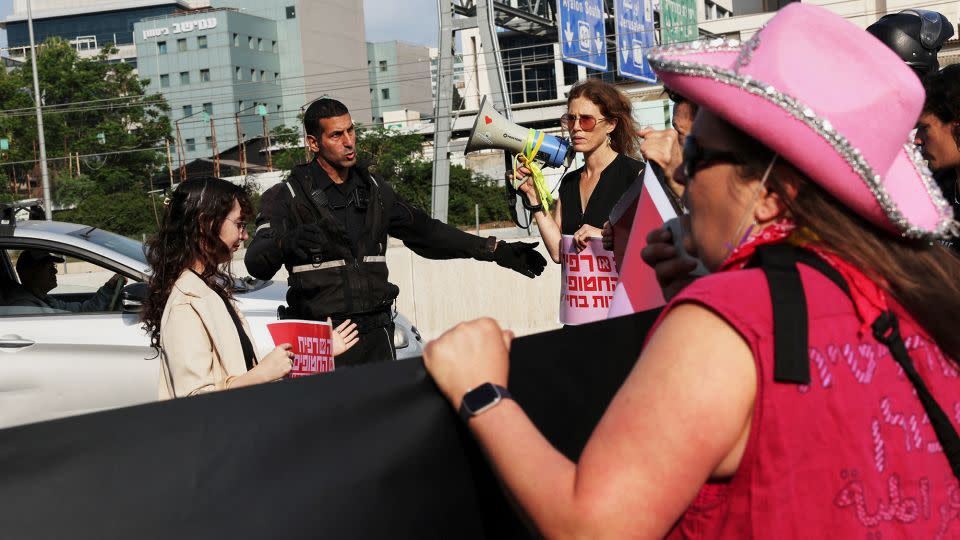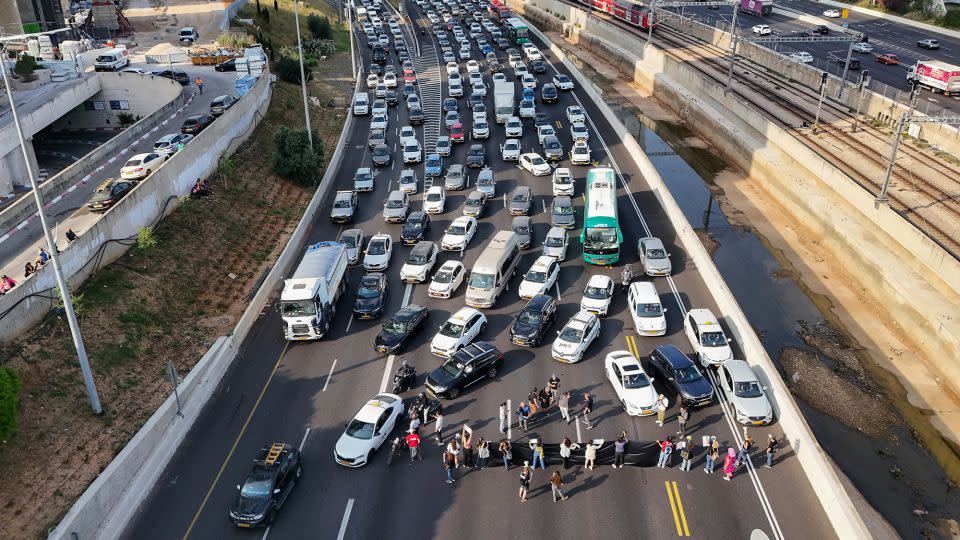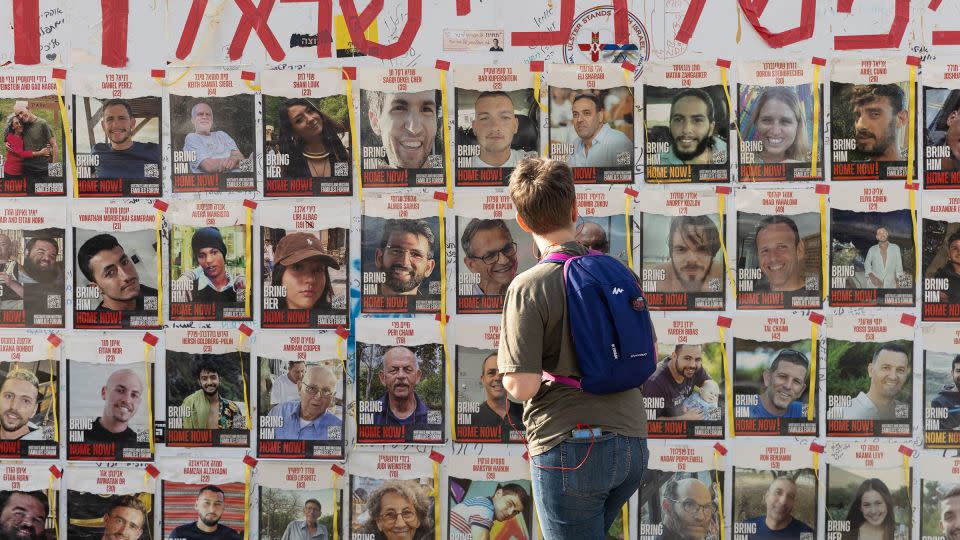Far-right Israeli ministers urge Netanyahu not to accept ceasefire proposal
- Oops!Something went wrong.Please try again later.
- Oops!Something went wrong.Please try again later.
Israeli Prime Minister Benjamin Netanyahu is coming under fierce pressure from far-right members of his government not to agree to the ceasefire proposal currently on the table, which could prevent an Israeli military offensive in Rafah from moving forward.
Hamas is considering a new framework for a deal proposed by Egypt that would see as many as 33 Israeli hostages released in exchange for a pause in the hostilities in Gaza that have raged for nearly seven months, an Israeli source familiar with the negotiations told CNN.
US Secretary of State Antony Blinken on Wednesday capped off his seventh round of shuttle diplomacy in the region since Hamas’ October 7 attack, as the Biden administration continues to push for a “ceasefire that brings the hostages home.”
But Orit Strook, Israel’s settlements minister and a member of the far-right Religious Zionism party, suggested that accepting the deal would “throw” Israel’s military progress and the sacrifices of its soldiers “in the trash,” only “to save 22 or 33 or I don’t know how many.”
Speaking to Israel’s Army Radio (GLZ) on Wednesday, she said a government that could accept such a deal after calling up “hundreds of thousands” of reservists has “no right to exist,” she said. Her comments caused outrage among some Israeli lawmakers and highlighted Prime Minister Benjamin Netanyahu’s struggle to appease the most extreme wing of his coalition.
Strook’s remarks come as Netanyahu mulls an incursion into Rafah, the southernmost point of Gaza to which more than 1 million Palestinians have fled after being displaced and where Hamas is believed to have regrouped after Israel’s destruction of much of the north of the Strip.

Despite domestic and international pressure to agree to a hostage-ceasefire deal, a vocal part of Netanyahu’s coalition have urged Israel’s military to continue into Rafah, prioritizing the destruction of Hamas over the return of Israeli hostages.
Bezalel Smotrich, Israel’s far-right finance minister, said Tuesday that accepting the proposed deal would mean “raising a white flag, and a victory for Hamas.”
“We have reached a crossroad in which Israel should decide between a clear victory and being defeated in this war with humiliation,” he said, urging Netanyahu not to accept the deal.
Itamar Ben Gvir, Israel’s National Security Minister, said last week that Netanyahu had “promised that Israel would enter Rafah, assured that the war would not end, and pledged that there would be no reckless deal.”
“I believe the prime minister understands very well the consequences if these assurances are not upheld,” he warned.
While Netanyahu faces pressure within his coalition to torpedo the deal, large parts of the Israeli public are demanding he accepts it. Families of the hostages blocked the Ayalon Highway in Tel Aviv on Thursday morning, calling on the governing to reach a deal to bring their loved ones home.
“Rafah or the hostages – choose life,” read a banner held by the protesters. Video from the scene showed a small group of protesters blocking seven lanes of the highway with traffic backed up out of sight.

Former Israeli Prime Minister and opposition leader Yair Lapid hit back at Strook’s remarks.
“A government with 22 or 33 extreme coalition members has no right to exist,” he wrote on X.
Benny Gantz, a member of Israel’s war cabinet but widely seen as Netanyahu’s most formidable rival and a potential successor, said over the weekend that the return of the hostages held in Gaza was more pressing than an operation in Rafah.
“Entering Rafah is important in the long struggle against Hamas. The return of our hostages, abandoned by the 7.10 government, is urgent and of far greater importance,” said Gantz, referring to the October 7 Hamas’ attacks on Israel when more than 1,200 people were killed and more than 200 people taken hostage.
“If a responsible outline is reached for the return of the hostages with the backing of the entire security system, which does not involve the end of the war, and the ministers who led the government on 7.10 prevent it – the government will not have the right to continue to exist and lead the campaign.”
Strook accused the radio station of misrepresenting her remarks and later sought to clarify her comments, saying that a deal would “finally abandon many of the hostages.” Any deal with Hamas would also see Israel abandon its efforts to “destroy the Hamas regime,” she said.
The new framework proposed by Egypt calls for Hamas to release between 22 and 33 hostages kidnapped in Israel and since held in Gaza in exchange for a pause in the fighting in the Strip, an Israeli source told CNN.
The latest proposal, which Israel helped craft but has not fully agreed to, is laid out in two phases.
In the first phase, between 22 and 33 hostages are to be released over several weeks in exchange for the pause and the release of Palestinian prisoners.
In the second phase, which sources have described as the “restoration of sustainable calm,” the remaining hostages, captive Israeli soldiers and bodies of hostages are to be exchange for more Palestinian prisoners.

Blinken met with Netanyahu in Tel Aviv Wednesday, following stops in Saudi Arabia and Jordan earlier this week.
“We’re determined to get a ceasefire that brings the hostages home, and to get it now,” Blinken said during a meeting with Israeli President Isaac Herzog, adding the “only reason that wouldn’t be achieved is because of Hamas.”
“We also have to be focused on the people in Gaza who are suffering,” he added, saying the focus also needs to be on “getting them the assistance they need, the food, the water, the medicine, the shelter.”
Outside the building where Blinken and Herzog met, protesters gathered outside holding posters and chanting, urging US President Joe Biden to “stop the war,” “save the hostages” and “bring them home.”
This story has been updated.
CNN’s Jeremy Diamond and Tamar Michaelis contributed reporting.
For more CNN news and newsletters create an account at CNN.com

